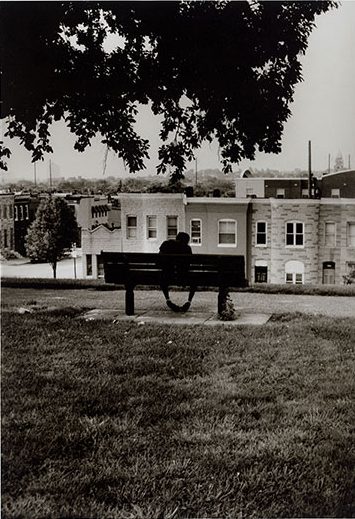
It began with a visit, on a calm December day, to a spacious, sunlit farmhouse on the edge of Leakin Park. There I encountered for the first time John Clark Mayden’s Baltimore “street portraits”—photographs set worlds away from that peaceful location … or so you might think.
I was there with Dr. Lawrence Jackson, Bloomberg Professor of History and English at Johns Hopkins, but also a Baltimore native and family friend of the Maydens. We gathered around the dining room table as John turned over his black-and-white prints one by one—a stunning display of luscious tones and deeply satisfying compositions that somehow suggest both spontaneity and thoughtful arrangement.
But, to be honest, my first impressions did not focus on these technical achievements. What I noticed first—more of a feeling than an observation, really—was the pop of connection. Through the interface of the photograph, I saw my fellow citizens, mostly Black, often framed by the doorways and windows of Baltimore’s iconic rowhouses, looking back at me with the full force of their gazes, or going about their business despite my presence. Whatever was happening in any given image, the photographer had opened a passageway through time, space, and race.
The seeds of the exhibition City People: Black Baltimore in the Photographs of John Clark Mayden were sown that day, as were the seeds of the companion book Baltimore Lives.
As planning for the exhibition proceeded over the next couple of years—with co-curator Christina Thomas—that first meeting must have stuck in my consciousness, its significance deepening over the long stretches of time devoted to gallery layout, lighting, graphic design, image selection, framing, installation, and program development. The quiet, green neighborhood where we met is, after all, only blocks away from Edmondson Avenue, which slides into Franklin, Mulberry, and Orleans Streets before ending at Pulaski Highway—a thoroughfare that connects the twin hearts of Black Baltimore, West and East.
In this city, you are never far from tragedy. You are also never far from a park, a street festival, a basement throbbing with Bmore club music, a high school field or court packed with adoring fans, a glorious nineteenth-century church, a vacant lot that, in spring, bursts into bloom. These other urban spaces, the ones we don’t see in the news, remind us of the complexity that is Baltimore.
If you forget for a moment that joy, wisdom, love, invention, and, yes, beauty can and do thrive here—right alongside poverty, violence, folly, and racial injustice—then you need only look around. That is exactly what John Clark Mayden does.
It must have been because we were filled with the sights we’d seen through John’s eyes that Christina and I chose for the exhibition’s title image this 2005 scene from Patterson Park. There are rowhouses in the background, but otherwise it doesn’t look much like the stereotype of Baltimore City. A silhouetted figure sits on a bench; something about him suggests he is a teenager or young man. Our distance from him gives him space, surrounds him with grass and the sheltering leaves above. Maybe he’s praying, or reading, or rolling a joint. His feet—bent together beneath his bench, as he turns himself into a perfect circuit—ask every question you might have.
Gabrielle Dean, PhD, is the William Kurrelmeyer Curator of Rare Books & Manuscripts at the Sheridan Libraries, Johns Hopkins University. With Christina Thomas, Denis Family Curatorial Fellow and Doctoral Candidate in History, she is the curator of City People: Black Baltimore in the Photographs of John Clark Mayden, on view at the George Peabody Library through March 1, 2020. A free, public opening celebration will take place on Sunday, October 27, 2019, 4:30 PM, at 17 East Mt. Vernon Avenue.
The exhibition draws primarily from the John Clark Mayden Collection, a gift to Johns Hopkins University from the Mayden family through the Baltimore Africana Archives Initiative, a joint undertaking of the Billie Holiday Project for the Liberation Arts and the Sheridan Libraries.
